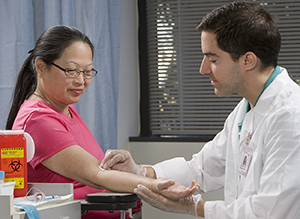Understanding Hepatitis B Virus (HBV)
Hepatitis is the inflammation of the liver. Hepatitis can be caused by infections, illegal drugs, toxins, and autoimmune conditions. Hepatitis B virus (HBV) is 1 of the viruses that can cause hepatitis. Hepatitis B can lead to serious liver damage and increase the risk for liver cancer.
Symptoms of HBV

Hepatitis B may not always cause symptoms. When there are symptoms, they may include:
-
Pain in the upper right part of your belly
-
Flu-like symptoms, such as tiredness, weakness, headache, and sore muscles and joints
-
Nausea, vomiting, and diarrhea
-
Yellowed skin or eyes, swollen belly, light gray or clay-colored stools, and dark yellow pee (jaundice)
-
Bruising or bleeding too easily (if the liver is damaged)
How is HBV diagnosed?
HBV is diagnosed by a blood test that looks for the virus in your body. Your provider will also take a detailed health history and do a physical exam. You may need other tests like an ultrasound of the belly and a liver biopsy.
Preventing the spread of HBV
A vaccine may prevent hepatitis B in people who don’t yet have it. Ask any sex partners and anyone who lives with you to get tested and vaccinated. HBV is spread through blood and bodily fluids.
Do:
-
Use condoms each time you have sex. And let your partner know if you have a diagnosis of hepatitis B.
-
Cover all skin breaks and sores. If someone helps you, have them wear protective gloves.
-
Get tested for hepatitis B if you are pregnant. In some cases, if you have the virus, your provider will advise treatment to help prevent infection to the baby. Get prenatal care so the correct blood tests can be done.
-
Get vaccinated against the hepatitis B virus if you are negative.
-
Contact your provider if you think you have been exposed to HBV.
If you have hepatitis B:
-
Don’t donate blood, plasma, sperm, or body organs or tissue.
-
Don’t share needles, syringes, straws, or any other drug equipment.
-
Don’t share razors, toothbrushes, nail clippers, blood glucose monitors, or other personal items.
-
Don’t get tattoos or body piercings from businesses that don’t have a license. And don’t get them done in informal settings.
© 2000-2024 The StayWell Company, LLC. All rights reserved. This information is not intended as a substitute for professional medical care. Always follow your healthcare professional's instructions.